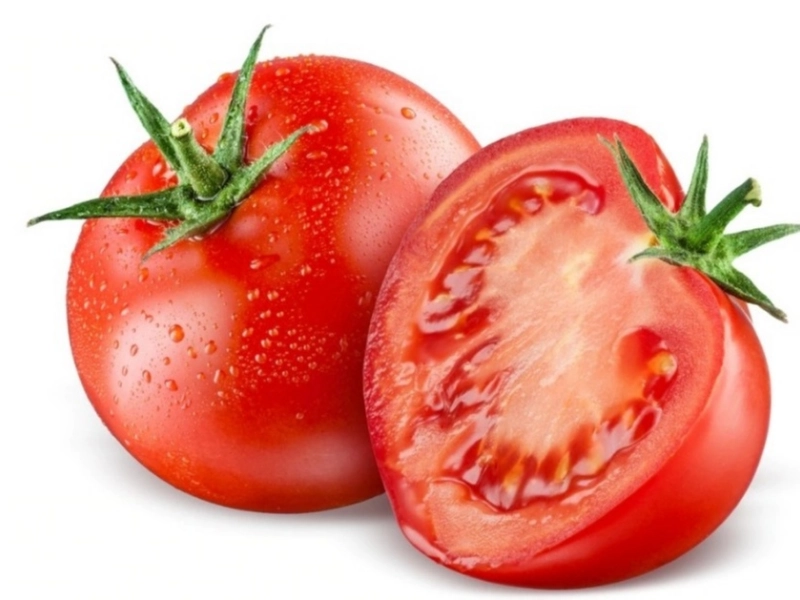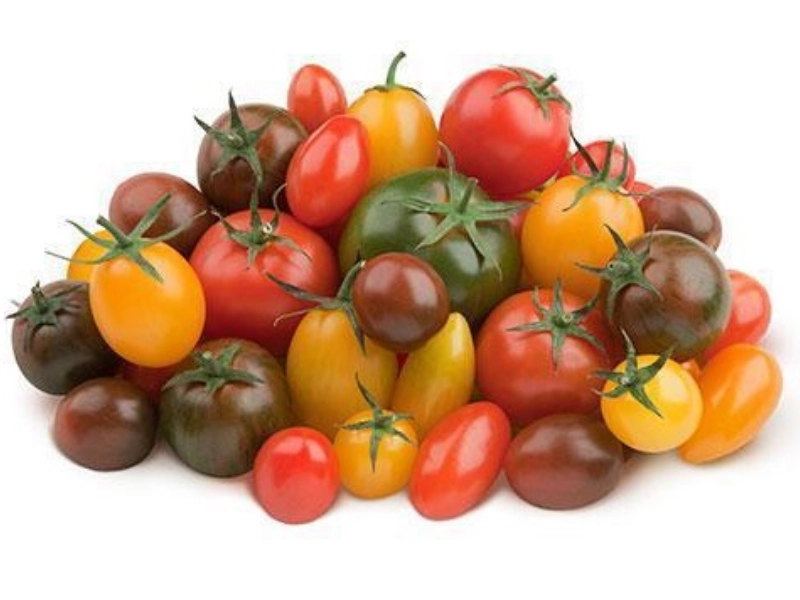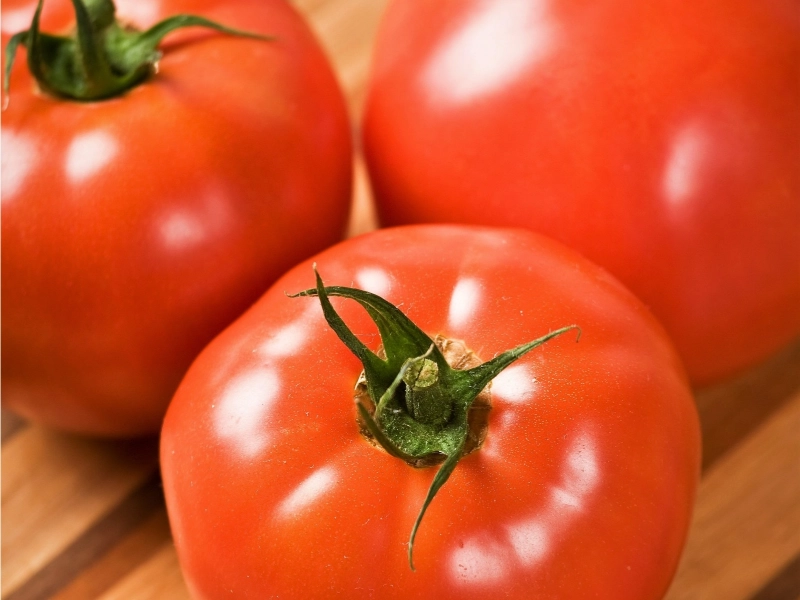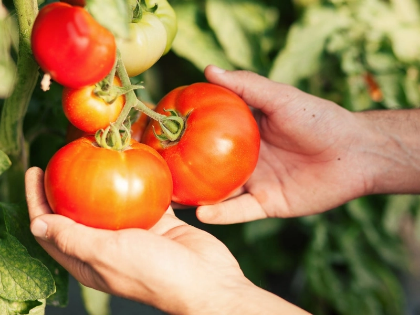Is it OK to Eat a Whole Tomato Every Day?
When consumed in moderation, tomatoes are loaded with advantages. They increase immunological function, stop blood clotting, lessen inflammation, and lower cholesterol. They include numerous other nutrients. Lycopene excess and kidney stone formation are just a couple of the negative effects of eating too many tomatoes. Additionally, acidic tomatoes can make some people's skin itch or make them allergic.
Lycopene can be found in abundance in tomatoes.

They provide a healthy dose of vitamin C.
 Vitamin C, which assists in reducing inflammation, is abundant in tomatoes and products containing tomatoes. They also include a range of other minerals, such as calcium, potassium, and folate, which guard against chronic illnesses and enhance general health. They may be consumed both raw and cooked, and they are a fantastic source of lycopene. It has been demonstrated that lycopene helps prevent cancer, controls blood sugar, and guards against heart disease and strokes. Tomatoes also have a low glycemic index, making them a healthy food for diabetics.
Vitamin A, which supports eye health and may reduce the incidence of macular degeneration, is abundant in tomatoes. They also contain a lot of lutein, which helps prevent UV damage and cataracts. They provide a high amount of antioxidants as well. They also include less salt and no fat. Smokers benefit notably from the lycopene in tomatoes since it fights free radicals and makes the arteries more elastic.
Vitamin C, which assists in reducing inflammation, is abundant in tomatoes and products containing tomatoes. They also include a range of other minerals, such as calcium, potassium, and folate, which guard against chronic illnesses and enhance general health. They may be consumed both raw and cooked, and they are a fantastic source of lycopene. It has been demonstrated that lycopene helps prevent cancer, controls blood sugar, and guards against heart disease and strokes. Tomatoes also have a low glycemic index, making them a healthy food for diabetics.
Vitamin A, which supports eye health and may reduce the incidence of macular degeneration, is abundant in tomatoes. They also contain a lot of lutein, which helps prevent UV damage and cataracts. They provide a high amount of antioxidants as well. They also include less salt and no fat. Smokers benefit notably from the lycopene in tomatoes since it fights free radicals and makes the arteries more elastic.
They are an excellent potassium supplier.
 The nightshade family, which includes tomatoes, is rich in potassium. A medium fresh tomato provides 292 milligrams of potassium, compared to 670 mg in a quarter cup of tomato puree. One cup of stewed tomatoes has over 15% of the recommended daily intake of potassium, making them even more beneficial.
Potassium is also abundant in leafy greens, including bok choy, spinach, and Swiss chard. According to USDA statistics, one cup of cooked spinach has 1,180 milligrams of potassium.
Another excellent source of potassium is kidney beans, which are also high in satisfying fiber and plant-based protein. According to the USDA, a cup of beans contains 713 mg of potassium.
Pomegranates, which are wonderful snacks and contain hundreds of small seeds, are filled with antioxidants that may lessen inflammation in the body. 566 mg, or 14% of the DV, of potassium can be found in one medium pomegranate. Pomegranate can be eaten as a standalone snack or as an addition to fruit salad.
The nightshade family, which includes tomatoes, is rich in potassium. A medium fresh tomato provides 292 milligrams of potassium, compared to 670 mg in a quarter cup of tomato puree. One cup of stewed tomatoes has over 15% of the recommended daily intake of potassium, making them even more beneficial.
Potassium is also abundant in leafy greens, including bok choy, spinach, and Swiss chard. According to USDA statistics, one cup of cooked spinach has 1,180 milligrams of potassium.
Another excellent source of potassium is kidney beans, which are also high in satisfying fiber and plant-based protein. According to the USDA, a cup of beans contains 713 mg of potassium.
Pomegranates, which are wonderful snacks and contain hundreds of small seeds, are filled with antioxidants that may lessen inflammation in the body. 566 mg, or 14% of the DV, of potassium can be found in one medium pomegranate. Pomegranate can be eaten as a standalone snack or as an addition to fruit salad.
They're a good fiber source.
 One medium tomato has 1.5 grams of fiber, making tomatoes a healthy source of this nutrient. This dietary fiber aids in encouraging regularity and sound digestion. The fruit also contains a lot of potassium, a mineral that lowers blood pressure and supports a healthy fluid balance.
Lycopene, in particular, can be a significant source of antioxidants in a tomato-rich diet. This vitamin promotes heart health and inhibits plaque buildup. Additionally, it enhances the benefits of other nutrients found in tomatoes, such as lutein and vitamin C. Lycopene is advantageous for the health of the eyes and helps guard against cataracts and macular degeneration.
Pick ripe tomatoes to make sure you're getting the most out of them. The flesh should be slightly malleable when pressed, and the skin should be red. Holding the tomatoes in your hand will allow you to gauge their level of juiciness. A tomato that feels slightly heavy is usually ripe, whereas one that feels light could be either overripe or unripe. In addition to their mouthwatering flavor, tomatoes are a wonderful source of fiber and water.
One medium tomato has 1.5 grams of fiber, making tomatoes a healthy source of this nutrient. This dietary fiber aids in encouraging regularity and sound digestion. The fruit also contains a lot of potassium, a mineral that lowers blood pressure and supports a healthy fluid balance.
Lycopene, in particular, can be a significant source of antioxidants in a tomato-rich diet. This vitamin promotes heart health and inhibits plaque buildup. Additionally, it enhances the benefits of other nutrients found in tomatoes, such as lutein and vitamin C. Lycopene is advantageous for the health of the eyes and helps guard against cataracts and macular degeneration.
Pick ripe tomatoes to make sure you're getting the most out of them. The flesh should be slightly malleable when pressed, and the skin should be red. Holding the tomatoes in your hand will allow you to gauge their level of juiciness. A tomato that feels slightly heavy is usually ripe, whereas one that feels light could be either overripe or unripe. In addition to their mouthwatering flavor, tomatoes are a wonderful source of fiber and water.








